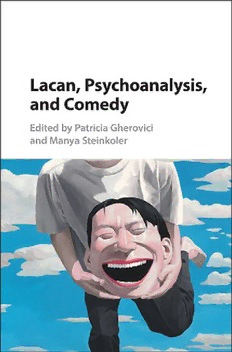
Lacan, Psychoanalysis, and Comedy PDF
Preview Lacan, Psychoanalysis, and Comedy
LACAN, PSYCHOANALYSIS, AND COMEDY This collection of essays explores laughter, humor, and the comic from a psychoanalytic perspective. Edited by two leading practicing psychoanalystsandwithoriginalcontributionsfromLacanianpracti- tioners and scholars, this cutting-edge volume proposes a paradigm swerve, a Freudian slip on a banana peel. Psychoanalysis has long beenassociatedwithtragedyandthereisastrongwarranttotakeup comedy as a more productive model for psychoanalytic practice and critique. Jokes and the comic have not received nearly as much consideration as they deserve given the fundamental role they play in our psychic lives and the way they unite the fields of aesthetics, literature, and psychoanalysis. Lacan, Psychoanalysis, and Comedy addresses this lack and opens upthe discussion. patricia gherovici is a psychoanalyst and analytic supervisor and faculty at Après-Coup Psychoanalytic Association New York. Sheis co-founder and directorof thePhiladelphia Lacan Group. manya steinkoler teaches literature, film, and psychoanalytic theory at Borough of Manhattan Community College, CUNY. She is a psychoanalyst and member of Après-Coup Psychoanalytic Asso- ciation New York and Espace Analytique (Paris). LACAN, PSYCHOANALYSIS, AND COMEDY PATRICIA GHEROVICI Après-CoupPsychoanalyticAssociationNewYork MANYA STEINKOLER CUNY 32AvenueoftheAmericas,NewYorkny10013 CambridgeUniversityPressispartoftheUniversityofCambridge. ItfurtherstheUniversity’smissionbydisseminatingknowledgeinthepursuitof education,learning,andresearchatthehighestinternationallevelsofexcellence. www.cambridge.org Informationonthistitle:www.cambridge.org/9781107086173 ©CambridgeUniversityPress2016 Thispublicationisincopyright.Subjecttostatutoryexception andtotheprovisionsofrelevantcollectivelicensingagreements, noreproductionofanypartmaytakeplacewithoutthewritten permissionofCambridgeUniversityPress. Firstpublished2016 PrintedintheUnitedStatesofAmericabySheridanBooks,Inc. AcataloguerecordforthispublicationisavailablefromtheBritishLibrary. LibraryofCongressCataloguinginPublicationdata Names:Gherovici,Patricia,editor.|Steinkoler,Manya,editor. Title:Lacan,psychoanalysis,andcomedy/[editedby]PatriciaGherovici, Après-CoupPsychoanalyticAssociationNewYork,ManyaSteinkoler, ManhattanCollege,NewYork. Description:NewYork:CambridgeUniversityPress,2016.|Includesbibliographical referencesandindex. Identifiers:LCCN2016015467|isbn9781107086173(Hardback:alk.paper) Subjects:LCSH:Lacan,Jacques,1901–1981.|Psychoanalysis.|Comedy. Classification:LCCBF173.L17932016|DDC150.19/5092–dc23LCrecordavailable athttps://lccn.loc.gov/2016015467 isbn978-1-107-08617-3Hardback CambridgeUniversityPresshasnoresponsibilityforthepersistenceoraccuracy ofURLsforexternalorthird-partyInternetWebsitesreferredtointhispublication anddoesnotguaranteethatanycontentonsuchWebsitesis,orwillremain, accurateorappropriate. Contents Introduction 1 Patricia Gherovici and Manya Steinkoler part i the laughing cure 23 1 Sarah’s laughter: Where babies and humor come from 25 Manya Steinkoler 2 Psychoanalysis as gai saber: Toward a new episteme of laughter 36 DanyNobus 3 Laughing about nothing: Democritus and Lacan 60 Patricia Gherovici 4 The surplus jouissance of the joke from Freud to Lacan 73 Marcel Drach 5 Can you spare a laugh? Lacan, Freud, and Marx on the economy of jokes 82 Jean-Michel Rabaté 6 Mother-pumper and the analyst’s donuts 104 Jamieson Webster 7 Not in the humor: Bulimic dreams 113 CarolOwens part ii comedy on the couch 131 8 Comedy and the agency of the letter in A Midsummer Night’s Dream 133 Matthew Sharpe v vi Contents 9 Psychoanalysis and tragicomedy: Measure for Measure after Žižek’s Lacanian dialectics 156 Geoff Boucher 10 Jane Austen’s wit-craft 184 Molly Anne Rothenberg 11 The perambulatory process: Eros, wit and society-testing in Henry James’s “The Chaperon” 206 Sigi Jöttkandt 12 Power in the closet (and its coming out) 219 Alenka Zupančič part iii he who laughs last, laughs last 235 Epilogue: Repetition, repetition, repetition: Richard Prince and the three r’s 237 Simon Critchley Index 243 Introduction Patricia Gherovici and Manya Steinkoler Laughter is not a decision – it happens to us, at times inappropriately and inauspiciously. Psychoanalysis is well known for having shed some light on the perennial mysteries of what we do not control – dreams, parapraxes,symptoms,andsexualproblems.WhiletheFreudianslipand thebungledacthavebecomepartofWesternculture’slinguafranca,itis less commonly known that psychoanalysis provides revelatory insights about the mechanisms of jokes, comedy, humor and their effects. Many people today would happily admit to their Oedipus Complex, but few wouldfeelcomfortablereflectingonwhytheylaughatthehumiliationof their co-worker, titter at an ethnic or sexist remark, or realize that like jokes,theirdreamsare made out of puns, witticismsand one-liners. Few note, as Freud did, that dreams were “insufferably witty,” revealing an annoyingpredilectionforbadpuns.Andfewerhavenoted,asLacandid, that comedy allows access to the unconscious. Ifsomeoneweretoaskwhatsinglebookoneshouldreadtounderstand the psychoanalyticmethod, theanswerwould beJokes andTheir Relation to the Unconscious. In one brief monograph, Freud succinctly explains howtheunconsciousoperates:itdoesthingswithwords.Thepsychoana- lytic cure is not just a “talking cure,” but to further play on Austin’s famousdictum,itdoesthingswithjokes.Weproposeaparadigmswerve, a Freudian slip on a banana peel. Freud revealed that dreams were the royal road to the unconscious. Freud also thought that by understanding the workings of the joke, we wouldbebetterreadersofourhiddenselves,discoveringknowledgewhere we did not expect it. Jokes and dreams share several characteristics: they outwitaninnercensor,allowsatisfaction,areproducedspontaneouslyand forgotten quickly, and are therefore subjected to repression. Jokes offer a shortcut to the unconscious we can use in broad daylight. Ashedidwithdreams,Freudgaveintellectualandphilosophicaldignity to jokes in his watershed book, Jokes and Their Relation to the Unconscious 1 2 patricia gherovici and manya steinkoler (1905). While Freud’s book is not about comedy per se, it unmasks the working of the jokes and of language, and this is the stuff dreams and comedy are made of. Freud perspicaciously noted to Fliess that “The ostensible wit of all unconscious processes is intimately related to the theoryofthejokeandthecomic.”1Asincomedy,dreamsandjokesbypass theobjectionsofconsciousnessoutwittingcensorship,disguisedbyriddles and homonyms. Dreams and jokes allow access to hidden wishes while granting aggression an acceptable outlet and establish a social tie that satisfies repressed unconscious desires. Illuminating the joke by exploring its psychic economy, Freud showed that, linguistically, jokes and dreams work by condensing and displacing meanings and making witty use of polysemy. Both dreams and jokes function by disguising and deforming latent content. While the dream may grant wish fulfillment for the dreamer alone, the satisfaction of the joke is shared, at least most of the time. Economically, the joke bypasses the inhibiting factor both in the teller of the joke and in the listener, allowing for a gain in pleasure. As two essays in this collection by Drach and Rabaté will make explicit, the psychic payoffs garnered by jokes, witticisms, and puns are subject to dynamics of economy. Jokes, Freud tells us, are a way we profit from the unconscious in waking life with laughter as the delightful dividend. Jokeswereseriousbusinessforthefatherofpsychoanalysis.Jokeswere serious business for Jacques Lacan, as well. Lacan’s re-reading of Freud’s joke book distances the joke from the folkloric terrain of ethnic Jewish studies that was Freud’s entrypoint, initially having envisioned his book on jokes as a monograph on Jewish humor. Extending Freud’s discoverythatthejokeandthecomicrevealthelogicoftheunconscious, Lacan’spsychoanalytictechniqueamplifiedFreud’slinguistictheorieson the Witz. Likeajoke,asuccessfulpsychoanalyticinterpretationconcernsnotonly a specific word’s meaning, but also its polysemy and its connotations. For Lacan, an analyst’s effective intervention is a kind of punctuation that operates on the analysand’s speech by what Flaubert called “le mot juste,” the “right word.” And, just as in the case of the punch line, the timing of the intervention is essential to its efficacy. Aaron Schuster has noted that 2 good timing is indispensable for the production of laughter. This is true 1 SigmundFreud,LetterfromFreudtoFliess,September11,1899.JeffreyMasson,editor.Thecomplete lettersofSigmundFreudtoWilhelmFliess,1887–1904.(Cambridge:HarvardUniversityPress,1985)371. 2 SeeAaronSchuster,“APhilosophyofTickling,”Cabinet50(Summer2013):41–48.
